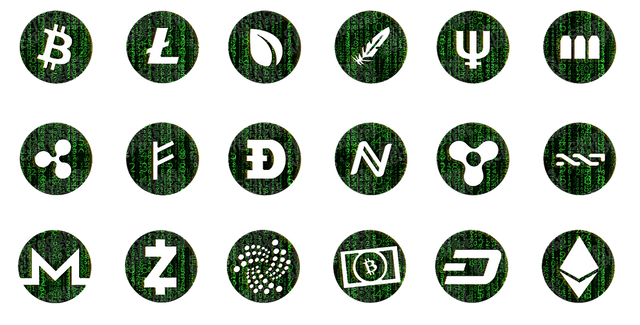It's 2018 and the CryptoWars Have Begun
It's happening.

The last decade has seen an unprecedented surge toward decentralization in nearly all areas of human activity--from transportation to politics to money. Blockchain technology and cryptocurrencies have played a huge role in this surge, but decentralization is far from reaching the critical mass necessary to ensure a victory over the authoritarian consolidation of wealth and power that has been building up for centuries.
Now, in 2018, things will be boiling to a head as the entrenched "Powers that Be" in government, banking, industry, and media are sitting up and taking notice. They no longer see the decentralization trend as a quaint subcultural movement. They now see it for what it is: a serious threat to the security of their dominion over the world economy, a wrench thrown defiantly in the gears of their ability to manipulate world events.
And they're not going to go down without a fight.
You can see evidence of the CryptoWars in every newsfeed and hear it on the lips of every talking head. The war's first battles are being fought quietly, as the Powers that Be rush to build up barriers against the dreaded decentralization in the form of taxes, regulations, and economic warfare; meanwhile, crypto enthusiasts struggle to put decentralized options in place to circumvent the Powers that Be.

Cryptocurrencies eliminate the need for traditional banking. Smart contracts eliminate any perceived need for bureaucracy. The decentralization revolution has people all over the world waking up to the fact that humanity can thrive without state control. Bankers and bureaucrats and public "servants" are shaking in their boots. They had no idea this thing was going to happen so fast. They thought they would have more time to prepare, more time to figure out their way around these developments, to ram all of these crazy new experiments in money and industry back into their little centralized pegholes. But they now realize that they were wrong, and they are acting swiftly to stamp out cryptocurrencies, or at least to bring them to heel, before they reach critical mass.
The Bitcoin Cash fork may have been the first and most important early battle in this war.
The introduction and subsequent recent surge of Ripple is likely another. In both of these battles, you can see the banking industry attempting to wrangle crypto into its sphere of influence. The Bitcoin Cash fork was an attempt to escape the bankifying of Bitcoin, while Ripple appears to be an attempt to Bitcoinify traditional banking. And now, untold numbers of prepaid Bitcoin Visa card holders around the world are receiving notices that their cards have been cancelled by the issuer. Visa will no longer play with Bitcoin.
World governments are fighting back, as well, with India, China, Russia, the European Union, and the United States all having passed major cryptocurrency legislation over the past year. The U.S. has meddled in the affairs of major crypto organizations like Coinbase and several U.S. based exchanges to the extent that the privacy and autonomy that the crypto revolution promised individuals has been seriously threatened, and now the government is poised to force exchanges to collect taxes on crypto-to-crypto transactions--a move that could shut down day trading for all intents and purposes. Meanwhile, rogue states like Venezuela are attempting to develop their own blockchain based currency applications in order to get around sanctions. Even North Korea is throwing its hat in the ring, as some industry experts suspect the dictatorship is behind several recent crypto hacks.
There are scores of theories about how this will shake out, who exactly is behind it all, and what their schemes are. I couldn't begin to guess at which ones are correct. But it's obvious that the war is on.

The world teeters on a historic precipice. On the one side is the violent and coercive thousand year history of the conglomeration of power through banking and statism, and a possible future in which this power continues to consolidate and centralize until its hold on all human activity is near-absolute. On the other side of the precipice is a new territory, a thrilling experiment in individualism, self-determination, and freedom brought about by the decentralization of politics, money, and industry.
The Powers that Be want very badly for us to slip back down the side of the precipice from which we came, to abandon our climb and fall back into the dark ages of authority and control. They are wily and disingenuous. They will use any emotional plea to gain support from those who aren't fully paying attention.
They will say, "Cryptocurrencies enable drug dealers. Think of the children!" And meanwhile, they will still be kidnapping children from loving homes, trapping them in indoctrination camps, and bombing them at Yemeni weddings.
They will wave their hand and cry, "Crypto mining hogs too many resources. Save the environment!" And with the other hand they will be fudging the numbers from the latest nuclear facility meltdown.
They will tell you, "Cryptocurrency is the money of terrorists!" And they will never mention the fact that their petrodollars are funded by wars upon wars upon bloody wars.
But in the end, if all of those dishonest appeals to emotion fail to turn the tide of crypto supporters, and even if they have no support for their actions, they will act violently to curtail the blockchain revolution.

So, as crypto enthusiasts, what is our recourse? What is our role to play in the CryptoWars? I have a few thoughts.
- Those of us who are ahead of the curve must use decentralized crypto exchanges and support decentralized crypto projects. The peer-to-peer exchanges are, at this point in their evolution, kind of weak and not very user-friendly. But in order for them to continue to evolve, they must be used. I know my way around an exchange and I'm well-versed enough to put up with the inconvenience and unwieldiness of the prototypes, so I feel it's my duty as a pro-decentralization person to use these exchanges, and perhaps to contribute feedback that will help the developers improve them.
- Those who are developing decentralized solutions must hurry to make the systems easy to use and the interfaces user-friendly. There's a reason why most people opt for centralized solutions in place of decentralized ones, and it's not only because they've never heard of the decentralized ones. In order to attract regular folks to, say, BISQ from Coinbase, BISQ needs to be every bit as clean looking and user friendly as Coinbase, but without all the stupid congestion and the ridiculous wait times. In short, decentralized solutions need to COMPETE.
- Resistance is essential. I'm talking about tax resistance, and I'm talking about the flouting of unjust laws.
- Businesses need to accept crypto directly. The trend of small and large companies adopting crypto has suffered a huge blow since Bitcoin network congestion resulted in long waits and astronomical transaction fees. This needs to be amended. I encourage every crypto investor to go out and recruit one business to accept Bitcoin Cash, DASH, Monero, or whatever your favorite coin is.
- Big banks should be boycotted as much as possible. Not just boycotted, shunned. I know it's hard, damn near impossible, to get by without a bank account. I suggest taking your fiat out of Bank of America, Chase, Wells Fargo, and the like, and opening up accounts with small local banks or credit unions instead.
- Keep using Steemit, DTube, and other blockchain based services that reduce your dependence upon centralized behemoths in media and other areas.
- Those flush with new crypto-wealth should be devising ways to take over the institutions traditionally run by the public sector. How can you use your wealth to decentralize power and bring vital voluntary solutions to the world's problems?
- What is your idea for how to strengthen the movement toward decentralization? How can we, as individuals, fight the CryptoWars? Tell me in the comments.
All images snagged from Pixabay under a Creative Commons License.
Great post! Let the crypto wars begin. Decentralized is definitely the way to go. It's also time to avoid Coinbase and Bittrex. Oh well...they got me into the crypto game and got me my alts respectively, but time to move on. I am also in the process of the switching from bank to a Municipal Credit Union. You are preaching gold...Resteemed!
In Australia, banks are blocking transfers to exchanges, saying that they can't be sure about money laundering. About 30 banks blocked deposits to one exchange.
I have signed up on Dashous to try to help people get into the market, but it seems like very few people use it at the moment. I also sell crypto to my friends to make it easier than buying from an exchange. I haven't used bisq yet, and I understand it's not that user friendly. But it's there at least.
When I make international transfers not using crypto, I like to use Transferwise. You do have to use the banking system to take advantage, but using a cheap transfer service like that means that, if banks block you from using exchanges in one country, you can probably deposit into another country. I don't think we'll need that solution long term, but short term it's a good way to show the banks that, as long as there's one bank in the world willing to work with us, they can't bully us.
Thanks Starr.
Banks are blocking transfers to and from exchanges here in the U.S., too. It's mostly the huge banks--the ones that were "too big to fail" back during the bailouts of the Bush administration. Paypal has also been shutting down accounts for cryptocurrency transactions.
I think a good way to get merchants to accept crypto is just to offer to pay them in crypto. A lot of them will decline, but then if you have a good rapport with them and continue offering each time you make a transaction, they might come around eventually. And it seems that as soon as someone receives their first bit of crypto, nine times out of ten, they're hooked. However, this method means actually spending some of your crypto, and that's a hard sell for hodlers.
I have confidence that decentralization will win out in the end. Cryptocurrencies aren't going anywhere, I know that much. But it is still within the power of governments and the global banking industry to make things real hard on us for a time, until we get our peer-to-peer systems in place.
I suppose I've shied away from paying with crypto because of how awkward it can be too introduce someone to a new technology. Once we tried going up Chapultepec avenue in Guadalajara, trying to buy coffee and other things with bitcoin. Even Starbucks, for which I had bought a gift card using BTC, wouldn't accept it. Also about five security guards told us to stop filming.
I've given a few dollars of Dash to friends. One of them saw it double and said okay forget everyone who told me this was stupid, how can I buy more. So that's cool, as long as crypto is sky rocketing.
Yeah, it probably works better if you already know the merchant and have a rapport with them. Otherwise, they'll think you're crazy or maybe that you're trying to stiff them on the bill.
I've helped at least ten friends and acquaintences get into crypto in the last year. It's very gratifying to see them become true converts!
I just discovered the other day that you can deposit cash directly into Coinspot without using a bank account - through newsagencies. other exchanges will likely follow.
Thanks for the heads up! I'll have to check that out.
are you from australia?
No... is it one of those Australia only things? :/
well coinspot is an australian exchange - allows deposits in AUD to purchase a very large selection of altcoins.
until recently, they allowed the use of a service called PoliPay - that was in partnership with 8-10 of the largest banks in australia - and you could just literally log into it using your internet banking credentials, and pick an account, and the deposit would go straight over instantly. a few australian exchanges used PoliPay.
in the last week of december PoliPay got withdrawn from all crypto exchanges, so we've been left using BPay (which is a bill payment platform and takes 2-3 days to process payments), or bank account deposits.
Now coinspot takes direct cash deposits where they give you a QR code, and you go to participating newsagency, they take the cash, scan the barcode, and the money lands in the account immediately.
just another chapter in the banks fighting against crypto.. i wrote a couple of blogs about it..
This.
“The Bitcoin Cash fork was an attempt to escape the bankifying of Bitcoin, while Ripple appears to be an attempt to Bitcoinify traditional banking.”
Is so right on. What a manifesto you wrote. Are you sure you ain’t Guy Fawkes?
If you'd ask me too, really impressive
Haha, well I'm definitely not Guy Fawkes, but I do commemorate the fifth of November.
It was only a matter of time before the fight began. The problem is the winner is usually the one with the most money and it is very hard to stand up against goverments and the banking sector.
Unless everybody pulls together in a new direction its hard to see any other outcome in the long run.
It won't be long before cryptoanarchists are the ones with the most money. ;)
Well in that case we should win the war. Tear down the corrupt institutions and do something more.
Darn right!
A good article - perhaps a bit dramatic - but the banks and governments are definitely trying to work out how to retain control in the world of crypto - and how to tax us most importantly.
I do disagree on one point though - you give Bitcoin cash too much credit - as if they're fighting some noble fight. Bitcoin Cash was nothing but a greedy and selfish cash grab that served to destabilise the entire crypto market.
We'll have to agree to disagree re: Bitcoin Cash. I think it's the decentralized option and it will continue to build worth and gain value.
Yet it's mere existence goes against the principal of decentralization, because one or two parties didn't like that their will wasn't imposed on Bitcoin core.
When lightening is released, Bitcoin cash will be well and truly forgotten.
Actually, I think that the ability of dissatisfied parties to fork from the blockchain and create their own version of it is a perfect demonstration of decentralization. The market will decide which coin or coins are most valuable, and that will depend a lot on ease of use. At this point, BCH has BTC beat all to hell.
I don't think the lightning network furthers, or is meant to further, the decentralization of Bitcoin. In order to use it, one of the parties on each channel will have to put up the amount of BTC that they expect to transfer on that channel in the future. That basically eliminates the possibility of BTC ever being used as a currency for small transactions. Do you think Target or Starbucks is going to open up a channel directly with a customer? Of course not. They will open up a channel with a middle man, who will make a percentage off of each transaction, like a credit card payment processor. Fast forward 1-2 years, and guess who controls most of the Bitcoin? As soon as I truly understood how the Lightning Network is proposed to work, that's when I knew that Bitcoin was going down the centralization hole.
i have no problem with software forking from bitcoin. The part that I don't like is when they fork the chain.
and I'm not sure how BCH has BTC beat to hell. Yeah it's cheaper and faster, but that's because it has a lot less demand, and they've chosen a very narrow minded short term focused scaling solution.
I don't agree with your reasoning that lightening eliminates BTC being used as a currency for small transactions. To the contrary, this will enable small transactions.
the idea is that nodes would be opened in commonly used channels - ie. there's no point in me opening up a node with target unless I'm transacting back and forth with target every day - however, I can open up a node with my employer who might open up a node with target, and then you have a network that way. Overall, the demand on the primary blockchain will be drastically reduced which lowers fees and transaction times.
In addition, it opens up to cross chain transactions - which further reduces theload on the BTC blockchain - I can do my spending at Target with my vertcoin, litecoin, or groestlcoin, or any other coin which becomes part of the lightening network. That is what true decentralisation is.
A very thought provoking post, as always :)
All hail bitshares and other truly decentralized networks.
Thanks Starr.
This was a great article! Upvoted and Resteemed!
And while I can appreciate the enthusiastic language, I think calling it a 'War' is a bit too much, and has the potential to scare people away, rather than having them engage with this exciting phase in societal development.
And ultimately I do believe the Blockchain, or a technology that follows after it, will 'win' in the end. This is not some delusion of mine, but simply
follows the old doctrine that the 'most efficient system' wins, and decentralized systems can and will be so much more efficient in the modern world.
Nice Fallout style cover pic. Maybe a touch dramatic. Then again, given the subject matter, there's really no telling how bad things could get as control over world finance is wrested from the hands of a few and returned to the hands of the many. Powerful, wealthy people do not take that lying down, and certainly have the means to raise hell for the rest of us, even if they should ultimately lose.
Dramatic, huh? People keep saying that. I thought I was being pretty balanced and restrained in my predictions, lol. Of course, I did use gritty cyberpunk illustrations to heighten the mood.
This is a great article and thank you for your suggested solutions. I'm new to the crypto world but what I've learned in the last few weeks has been eye-opening and empowering. It seems like there could be a real fork in peoples options soon and they can either go down the route of perceived security and safety in exchange for being managed and controlled at every level, or into the exciting new space of blockchain based decentralised infrastructure which feels edgy and a bit wild west until you get used to it.
It is in their nature to try and turn it into a war and the solution is to ultimately make their systems obsolete.
THIS.
Excellent thought provoking article. We are luckier here in Europe that Crypto is deemed a currency, but then with the US debt catastrophe it's no wonder they are seeking taxes from every avenue.
I do disagree on the statement that the powers that be want us to fall back into the dark ages of authority and control, social media, smartphones, store cards ect,I believe lead the masses blind into authority and control in a perverse way as now instead of them demanding to know what we are doing we just give them all that information without a care in the world.
George Orwell may have been off with the year but boy we are racing to it.
Yeah, that's pretty much what I meant. Decentralization promises true freedom in the absence of government authority and control, and the powers that be want to keep us from reaching that zenith by any means possible. One of the means they are using is coopting the new technology to enhance their ability to control the population...new era, new tech, same m.o.